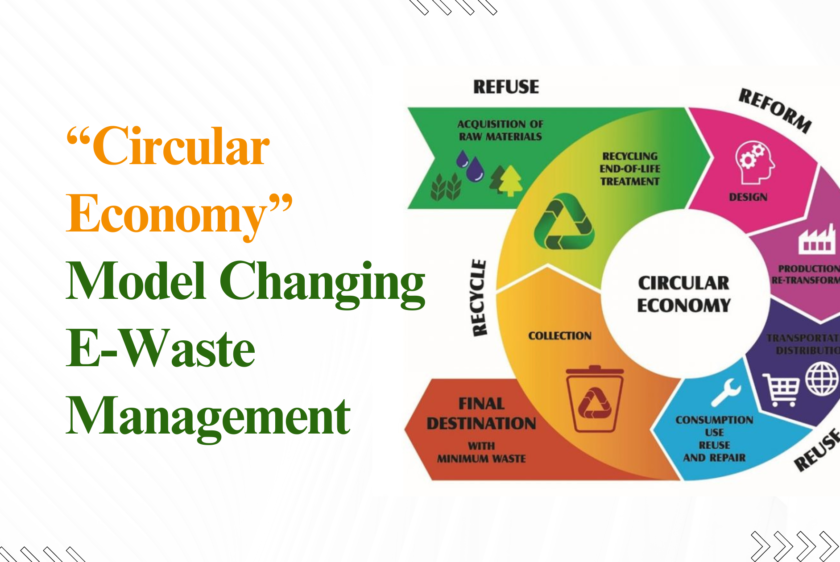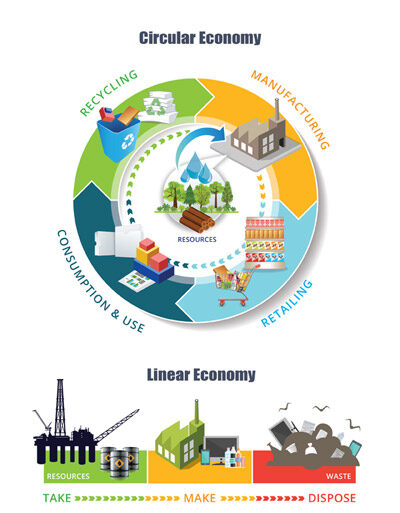
How Is The “Circular Economy” Model Changing E-Waste Management?
In the fast-paced world of technology, the rapid advancement of electronic devices has brought about unprecedented convenience and connectivity. However, this surge in technological innovation has also led to a concerning rise in electronic waste (e-waste). Traditional linear models of production and consumption have contributed to the environmental burden posed by discarded electronics. In response to this challenge, the circular economy model is emerging as a transformative force in reshaping e-waste management.
Circular Economy Model:
The circular economy model is an alternative approach to the traditional linear economy, which follows the “take, make, dispose” pattern. In contrast, the circular economy aims to reduce waste and make the most of resources by promoting sustainability and circular practices. This model emphasizes the importance of keeping products, materials, and resources in use for as long as possible, thereby reducing the environmental impact of manufacturing and disposal.
Key Principles of the Circular Economy Model in E-Waste Management:
Design for Longevity and Repairability:
Manufacturers are increasingly adopting product designs that prioritize durability, ease of repair, and upgradeability. This shift discourages the disposable nature of electronics, extending their lifespan and minimizing the frequency of replacements.
Reuse and Refurbishment:
Embracing the circular economy means shifting focus from single-use to multiple-use. E-waste management is being revolutionized by the refurbishment and resale of electronic devices. Companies are investing in refurbishing centers to give products a second life and prevent premature disposal.

Recycling and Material Recovery:
Circular economy principles promote responsible recycling and material recovery. E-waste recycling facilities are becoming more sophisticated, extracting valuable materials from discarded electronics while minimizing environmental impact. Techniques like urban mining are gaining traction, allowing for the recovery of precious metals from electronic waste.
Extended Producer Responsibility (EPR):
The circular economy model advocates for a shared responsibility among manufacturers, consumers, and governments. Many jurisdictions are implementing Extended Producer Responsibility (EPR) regulations, making manufacturers responsible for the entire life cycle of their products, including proper disposal and recycling.
Product-as-a-Service (PaaS) Models:
The circular economy encourages innovative business models, such as Product-as-a-Service (PaaS). In this model, consumers access the functionality of a product without owning it outright, shifting the responsibility of maintenance and disposal to the manufacturer. It reduces the burden on consumers and fosters a more sustainable and resource-efficient approach to electronic consumption.
Challenges and Opportunities
Despite the potential benefits of the circular economy model in e-waste management, several challenges persist. Key obstacles include:
• Logistical Complexities: Establishing efficient collection and recycling systems poses logistical challenges, requiring collaboration between governments, industries, and communities.
• Technological Limitations: Advanced recycling technologies need further development to enhance material recovery rates, addressing the complexity of electronic components.
• Consumer Behavior: Shifting consumer behavior from a disposable mindset to one focused on repair, reuse, and responsible disposal requires education and awareness campaigns.
Overcoming these challenges requires collaborative efforts from policymakers, industries, and consumers to promote awareness, invest in infrastructure, and incentivize sustainable practices.
Opportunities abound as well:
• Innovation: The circular economy fosters innovation in product design, recycling technologies, and business models, opening new avenues for economic growth and sustainability.
• Job Creation: The switch to a circular economy creates opportunities for skilled jobs in recycling, remanufacturing, and sustainable product design.
• Resource Security: Recycling and reusing materials contribute to resource security by reducing dependence on finite resources and mitigating environmental degradation.
Final Outcome
The circular economy model offers a promising solution to the growing e-waste challenge by prioritizing sustainability, resource efficiency, and responsible consumption. By embracing circular economy principles, stakeholders can mitigate environmental risks associated with e-waste, promote a more sustainable approach to electronic consumption, and pave the way for a resilient and circular future. It’s imperative for society to collectively adopt and implement circular economy practices to address the e-waste crisis and build a more sustainable world for future generations.







